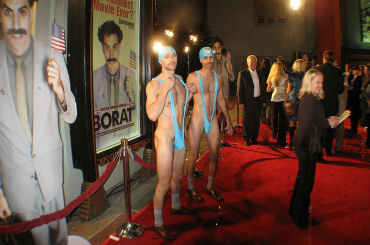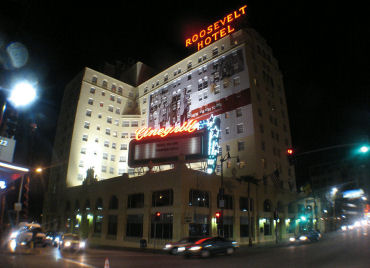“The Daisy on Rodeo Dr., the MLK diner on Wilshire Blvd. where we all used to go at 2 in the morning, the Luau on the corner — they’re all gone. All the time I’m passing places that were part of my history here but they’re not there now. I’m walking down the street and seeing things and people that only I can see. The town is full of ghosts for me. Frank Sinatra was a friend. Fred Astaire, Danny Kaye…they’re no longer here.” — The Prestige costar Michael Caine speaking to the Toronto Star‘s John Hiscock, and posted three bloody days ago.
wired
Reporter re-design
The online re-design of the Hollywood Reporter, which went up three days ago, has resulted in something that doesn’t have much of a pulse. It’s hard to put your finger on it exactly, but somewhere on high the ghost of Billy Wilkerson is scrunching his face and going, “Whaaat?” A Hollywood trade paper needs to throw in some hot licks and boogie it up some — it can’t be too corporate-looking or it won’t look like a Hollywood trade paper. Honestly, this new thing could be a website for some Midwest furniture manufacturer or ice-cream distributor. The recent Variety re-design was agreeable, but this one isn’t — it needs to say “film capital of fthe world” and it doesn’t.
One of my all-time favorite Charles Bukowski lines is about how if you live in this town long enough “the stink of L.A. gets into your bones.” That’s what the new Reporter design lacks — the aroma of particular history. The entire world has been molded by the culture that arose out of the L.A. entertainment industry (however lacking or unwelcome this may seem to some). Hollywood has always been fueled by primal appetites and crazy dreams and schemes, but you’d never know it by looking at this.
Andersen on dying Times
Writing in his New York magazine column (i.e., “Imperial City”), Kurt Andersen has explained and nailed what I’ve long hated about the L.A. Times (except for some of the Hollywood coverage): “L.A.’s liberalism remains far more circa-1975 paleo than New York City’s, and the L.A. Times‘ journalism, which tends toward the dull and the earnest, reflects that. Racking up Pulitzer Prizes — the paper’s won fourteen in the last six years — doesn’t mean that a paper is exciting or essential to its readers, and can even be a contraindicator.
“The notion that tedious worthiness equals substance and importance and vice versa is compensation for the elites’ anxiety about the very L.A.-ness of L.A. — sun, fun, show business, too few intellectuals and crowded sidewalks, too many fake breasts and self-confident dumb people.”
The column was prompted, of course, by the Times‘ circulation shrinkage and the various contractions that have resulted:
“Most newspapers are dinosaurs, certainly as newsprint creatures, facing extinction sooner rather than later. Our cretaceous era is ending,” Amnderson recaps. “But the Los Angeles Times is the Brachiosaurus of its genus. In 1990, it had a daily circulation of 1.2 million, as big as [the N.Y.] Times. Today, it’s down to 850,000, and the decline has accelerated since 2000, when the Tribune company bought the paper.
“Naturally, Tribune executives in Chicago have wanted to cut expenses accordingly. And naturally, people at the paper hate the perpetual game of musical chairs. Last month, editor Dean Baquet publicly refused to go along with any further layoffs, and Jeff Johnson, a Tribune lifer who had been his publisher for only a year, publicly supported him. ‘Newspapers,’ Johnson was quoted in an article in his own paper, ‘can’t cut their way into the future.'”
Tedious worthiness! That’ll hold me for a few days.
Borat pics
It was great to finally see Borat: Cultural Learnings of America for Make Benefit Glorious Nation of Kazakhstan (20th Century Fox, 11.3), even if it was on a very gracious, Russian-potato-line, second-class invitee basis.
Invited guests to last night’s premiere were made to wait in a totally non-moving line on Hollywood Blvd. last night for a very long while, and while it was hardly painful or humiliating — it was a nothing, a shrug-off — this sort of thing never happens at a premiere. The usual drill at any premiere is to walk up to will-call, get your ticket and go inside and grab a bag of popcorn. Nobody could figure out the delay but the general sentiment was one of vague irritation and “why?” And then we were kept waiting another half hour or so once we were in the theatre and seated.
Borat is fall-on-the-floor funny. Hilarious, outrageous, brilliant, diseased. It’s true about it being a slash-and-burn satire of American yahoo-ism. If red-staters are good sports they’ll laugh along with everyone else, but some devotees of the Pentecostal faith are probably going to have concerns. The mock anti-semitism is inspirational; I loved the throwing of dollar bills at the Jews disguised as cock- roaches. And the naked wresting scene is without question the single most appalling thing I’ve seen in a film in years. Make that decades. And thass okay! I like it!
Borat star-producer-writer Sacha Baron Cohen spent an hour (longer?) talking to electronic press people on the red carpet. Journalists like myself and the Holly- wood Reporter‘s Borys Kit and N.Y. Times reporter Sharon Waxman didn’t get to attend the premiere showing at the big Chinese theatre — we were shunted off to an upstairs theatre at Mann’s Chinese 6.
Variety reported that the plan was for Cohen “to be ushered into his preem by a phalanx of Kazakh locals bearing fruits and wonders of the country. Plans were for ‘Borat’ to be carried, bridelike, to the podium by an oversized woman. There, he would address the throng of press and fans and respond to a recent invitation to visit Kazakhstan, which has tried to disown Borat almost from the moment he claimed it as his country of origin.”
Another “Borat” tracking story
Variety‘s Michael Fleming and Ian Mohr have run the third significant story about how Borat‘s tracking isn’t all that terrific (“Kazakh Quandary”), following Nikki Finke‘s Deadline Hollywood Daily 10.17 piece and my own 10.19 article on this topic. Oh, yeah…Poland ran something also.
“While Borat has benefited from a wave of crackling Internet buzz, strong reviews and knockout festival screenings, Borat hasn’t registered as strongly in tracking reports,” Fleming/Mohr have written. “So far, it has scored below rival fare, from Catch a Fire to Babel, in audience awareness. But Fox maintains standard tracking methodology doesn’t apply. ‘This is a new genre of movie,’ said Jeffrey Godsick, exec vp marketing for 20th Century Fox. ‘The awareness is beginning with a targeted audience. When you are breaking a new kind of genre, not everyone knows what to make of it.'”
The way I put was that “it goes without saying that awareness and interest levels are through the roof with media, industry, ubers and early-adopter types but otherwise it’s looking like it may be a little too hip for the room, ‘the room’ being pretty much everyone else. Maybe Sacha Baron Cohen‘s goofy-dry put-on humor only travels with a certain clientele. Maybe people are starting to hear that Borat is basically about Cohen’s Kazakhstan culture reporter goofing on Middle Americans and maybe that’s not going down so well with some. Or maybe they just haven’t tuned in yet.”
The Variety story quoted “a rival studio distribution exec, who attended a recent Borat screening that was part of the buzz-building Los Angeles Blackcarpet screening series organized by MySpace.com, described audience reaction as nothing less than manic. Lines snaked around the block. Kids, dressed in Borat garb, took to a mike positioned in front of the auditorium to do their best impersonations.”
Fleming-Mohr also wrote that while “skeptics pointed to the internet-hyped Snakes on a Plane as a reason for caution, others noted that while Snakes was slammed by critics, Borat has received glowing notices so far.”
Turkeys in a field
“With a multitude of highbrow movies competing for the same adult audience” during the fall-holiday Oscar season, “film after film takes a nasty tumble,” writes L.A. Times industry columnist Patrick Goldstein. His piece refers more to last year’s wipeouts than this year’s, understandably. It seems fairer to let the fate of pedigree movies like Stranger Than Fiction find realization by God’s awful grace.
“Last year, for example, a host of movies tanked at the box office despite being touted — either by the studios or some breathless Oscar prognosticator — as having Academy Award potential. A partial sample includes Jarhead, Memoirs of a Geisha, The New World, North Country, Casanova, The Producers, Elizabethtown and In Her Shoes.”
The hauntingly beautiful forest primeval nebulousness in Terrence Malick‘s The New World made it seem like a doomed proposition from the start. (Because it was too self-importantly unto itself and romantically unsatisfying to boot.) Like- wise, everyone knew from the get-go that Lasse Hallstrom’s Casanova was too light and confection-y. And I still choke up over the failure of Curtis Hanson‘s In Her Shoes to get any Oscar traction. Talk about inexplicable. I still think that film is teeming with the right stuff, especially given the perfect performances by Toni Collette, Mark Feuerstein and Norman Lloyd.
But Geisha, Jarhead. North Country and Elizabethtown came out asking to be picked off, like wild turkeys in an open field. And I still feel very satisfied — I can even say comforted — that I was part of the team that took down (or at least helped to take down) Munich.
“Some of these movies would undoubtedly have failed no matter when they were released,” Goldstein writes. “But I’d argue that many of them would’ve had a better chance for survival if they’d had a chance to find an audience in a less competitive environment. In the fall, the bar is perilously high: Every movie is graded on an Oscar curve instead of being judged on its own merits. If some of these movies had been released in a quiet weekend in the spring when quality-starved adults had nothing else to see at the multiplex, they might have had a fighting chance for survival.
“This year the Oscar Follies are back. I’m sure every studio chief believes he or she is simply doing what’s best for the film’s box-office chances, since a best picture nod often gives adults an added incentive to see a serious movie. Unfortunately, of the 25 or so adult movies jammed into the last 12 weeks of the year, only five will get one of those cherished nominations. The rest will be orphans, ignored instead of adored, left to wither on the vine when all the free media hype goes to the five lucky nominees.
“The problem is simple enough: No one wants to tell a hotshot filmmaker — or admit to him or herself — that a film isn’t good enough to compete. Instead the studios put the blame on us, claiming that we won’t support any serious movies the other 40 weeks of the year. But the real reason all these good movies are coming out at exactly the same time is because everyone in Hollywood is smoking the Oscar crack pipe.”
Black, piracy, “Destiny”
It’s been on YouTube a little while, but here’s the latest celebrity hipster put-on: Jack Black delivering an anti-piracy message disguised as a plug Tenacious D in ‘The Pick of Destiny’ (New Line, 11.17).
Is “Flags” losing steam?
N.Y. Times staff writers David Halbfinger and Allison Hope Weiner — sniffing around for a story after last week’s news that attorney Bert Fields will skate in the Anthony Pellicano wiretapping prosecution — have gone after Clint Eastwood‘s Flags of Our Fathers for not making more money last weekend.

Earning a meager $10.2 million on 1800 screens — described as “a relatively tiny beachhead that did not match expectations or its mostly strong reviews” — means casting a moderately negative light on the fact that Paramount is now going to have to spend a shitload on their Flags Oscar campaign to keep it in the game because industry folk sometimes dismiss would-be Best Picture contenders if they don’t connect strongly with the paying public.
This isn’t one of those the-ship-has-been-hit-by-a-torpedo stories. Nobody’s yelling “general quarters!” It’s more in the realm of a do-we-have-enough-fuel-to-make- it-to-port-without-having-to-row? stories.
Halbfinger and Weiner are too immersed in their usual airs of circumspect Times– ian posturing to be blunt about it, but their story’s bottom-line verdict is this: a weak box-office means that even if Flags winds up with a Best Picture nomination (which may well happen due to the wide respect enjoyed by Eastwood), forget the Big Win. This movie is not Million Dollar Baby and Clint’s already got two Best Picture Oscars. Spread it around.
Flags is listing somewhat because — hello? — the core audience appears to be over-40 boomer males and because it’s not getting much support from the under-30s, who aren’t exactly flocking to it, probably because they think it’s too old-guyish or lacking a certain 21st century visual vitality, or perhaps because they feel it’s overly thoughtful and meditative and we don’t want too much of that shit weighing us down, right?
A lot of HE readers responded to Peter Howell‘s observation last Saturday about older people constituting the bulk of the audience at a Toronto screening he attended, and…well, c’mon, the idea that young people aren’t digging it that much or even giving it a shot seems fairly obvious to me. But Halbfinger and Weiner barely mention the age/generation factor. They breathe on it but that’s all.

They mainly stay in their own comfort zone and ask whether or not Flags could have opened on an earlier or later date, and mention that a lack of big-name stars probably didn’t help, and that the glowing reviews didn’t seem to help much. They also quote Paramount distribution chief Rob Moore as suggesting that if anything goes wrong, it’s Clint’s fault because he was running the show all along. (Remem- ber Charles Grodin pointing to Dyan Cannon at the end of Heaven Can Wait and shouting, “She did it! She did it!”?)
Their best quote is from DreamWorks marketer and Oscar strategist Terry Press, who, according to Halbfinger and Weiner, believes that “the film’s reviews hold out hope that, once the movie makes it to December, it could wind up on the year’s- best lists and start piling up the kind of accolades that might prompt moviegoers to give it another look.”
“When you have that level of respect, you have to go the distance here,” Press says. “There is no other choice for a movie like this but to go the distance.” That is one thing this movie has in spades, even from mixed-reaction types like myself — respect. That in itself may provide the necessary fuel.
Cohen vs. Strauss
Last Friday’s Borat press conference included this exchange between producer-writer-star Sacha Baron Cohen (in full Borat character, of course…the guy never lets his real self, whomever and whatever that is, pop through) and L.A. Daily News critic Bob Strauss , who got a bit bored with the heavily-scripted nature of the press conference and went with a sudden urge to heckle Cohen and…you know, swat the tennis ball back and forth and see what might happen. Here’s Strauss’s recollection of how it went down, and here’s a link to IGN’s press conference video.
Red sun, black troops.
This Guardian piece by L.A. correspondent Dan Glaister says almost 900 African-American Marines took part in the battle of Iwo Jima — mainly in a backup/ support mode but with some engaging in sporadic combat — and yet there’s not a single American-American face in Clint Eastwood‘s Flags of Our Fathers. A Warner Bros spokesperson tells Glaister that “the film is correct based on the book” — i.e., James Bradley and Ron Powers‘ book of the same name. For what it’s worth, I called and asked my dad — a Marine lieutenant who fought all through the 35-day Iwo Jima battle — if he ran into any black troops, and he said, “No, I didn’t see any. But the Marines Corps. was very racist back then.”
Friedman/Ono/Lenon
I’m in full agreement with the second half of the second story in today’s Fox 411 column, in which Roger Friedman rips The U.S. vs. John Lennon a new one.

Friedman begins with the obvious about David Leaf and John Scheinfeld‘s film, which is that it opened limited via Lionsgate on 9.29.06, earned about $551,821 (per the IMDB) and is now — a bit more than three weeks later — gone. Friedman attributes this relatively short theatrical life to Lennon’s widow Yoko Ono, the film’s executive producer, who “did here what she accomplished last summer in her Broadway musical about the late Beatle, which was to entirely rewrite or omit [Lennon’s] history.
“Gone are the years 1973 and 1974 when Lennon had left Ono for May Pang and lived in Los Angeles. Erased is Lennon’s elder son, Julian, as well as nearly all mention of the Beatles. Never even spoken are the names of the other Beatles. What seems pretty clear is that Leaf and Scheinfeld made a deal with the devil. Ono isn’t listed as one of the producers — there are 16 altogether — but she’s thanked so many times in the credits that it’s almost a joke.
“Leaf and Scheinfeld clearly would not have had her participation, rights to music and videos and Lennon’s likeness without her assent. The result is yet another Ono history hatchet job that no one can really take seriously. What a shame.”
“This mirrors what I said about the film last August, which was that the Lennon portrayed in The U.S. vs John Lennon “is indeed scrubbed clean and phony as a three-dollar bill, and there’s no doubt in my mind that Leaf decided on this portrait — Lennon as a kind-of St. Francis of the anti-war movement, a guy who did nothing but good things and spoke only of love and peace and stopping the killing — under the influence of his and Scheinfeld’s alliance with Lennon’s widow.
“I call it the ‘Curse of Ono‘ — the more control she seems to have over any portrait of the late ex-Beatle, the more sugar-coated it turns out.
“Like anyone else, Lennon was a mixed bag — part genius, part beautiful guy, part angry guy, part saint, part asshole, part man-of-courage, part prima donna, part gifted troubadour, part abusive drunk (during his 1974 ‘lost weekend’ phase), part mystical seeker. But you only get the positive stuff from Leaf-Scheinfeld-Ono. And after an hour or so of the vigilant, heroic, positive-minded Lennon, you want to barf.”



